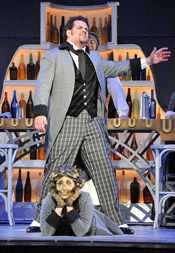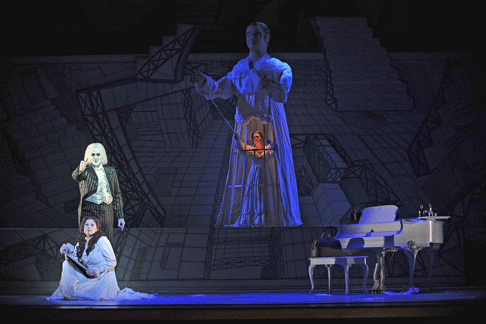If both of those roles are taken up by such
the rarified performer, it would behoove you to stage a sit-in at the box
office. Florida Grand Opera can boast to the latter situation with its
production of Hoffmann (seen opening night, January 22).
The detail in three of Bradley Garvin’s four villains, each with
oodles of personal stamp, made it easy to forget that he has taken the roles up
only 15 times, covering them at the Met last season. This was the
bass-baritione’s FGO debut. Lindorf was a less developed, more ambiguous
character for Garvin — a bother for certain, probably not evil incarnate.
By turns, Garvin’s Dr. Miracle was cruelly insinuating and, knowing
Antonia’s heart, ruthlessly played on her weaknesses. Garvin’s
transformation included a more backward vocal placement and an eerie French
brogue, adding a backward leaning stance and the creepy pointing of bony
digits; this Dr. Miracle exorcised the living force within Antonia with quiet
mayhem.
 David Pomeroy as Hoffmann and Katherine Rohrer as The Muse/Nicklausse
David Pomeroy as Hoffmann and Katherine Rohrer as The Muse/Nicklausse
In Elizabeth Futral’s first essaying of the four heroines, her
greatest challenge may well be making a believable woman-as-object out of
Olympia in a production that plays up the phantasmagorical in Offenbach’s
story. Olympia’s costume is a cumbersome cubed-patterned dress, with an
exaggerated petticoat that gives way to a box and keyhole — her cranking
mechanism. Futral darkened her voice, her word texturing the stuff of magic
itself, as she became a helpless and aimless Antonia, on breakneck course to
lose her soul.
Hoffmann was the role of David Pomeroy’s Metropolitan Opera debut in
2009 and the Canadian tenor did many things right in his opera debut with FGO.
The tale of the dwarf Kleinzach was finished well, his singing in the duet with
Antonia was impassioned, and by the epilogue, Pomeroy had plenty in reserve to
return to the final revelation of the Kleinzach legend. His voice is a husky
one that he covers or not at will below the passagio — this is Hoffmann
as a bit of a brute.
In another company debut, Conductor Lucy Arner seemed at home in the French
Romantic repertoire. Arner’s keen sense of tempi and firm hand made
rhythmic timing with singers — one of Hoffmann’s musical moguls
— look easy. The type of delicate instrument playing elicited for
Nicklausse’s short solo in Antonia’s Act reminded that the
conductor has extensive experience in chamber music. Katherine Rohrer (The
Muse/Nicklausse) is a real sprite, most memorable in the latter song and in
serially mocking Hoffmann’s attraction for Olympia. Matthew Dibattista
took on Offenbach, Cochenille, Frantz and Pitchinaccio, carrying on especially
heartily in Frantz’s aria. Phillip Skinner made both Luther and Crespel
relevant. FGO was rewarded by entrusting the roles of Henri Meilhac, Wolframm,
and Schlemil to Young Artist Craig Colclouch. Other Young Artists that
acquitted themselves favorably were James Barbato (Wilhelm), Jonathan G.Michie
(Hermann), Daniel Shirley (Nathanail); Young Artist Courtney McKeown’s
assignment as Antonia’s mother is rather unorthodox here, from the inside
of a huge male action figure, she moved the thing about as she sang.
 Elizabeth Futral as Antonia, Bradley Garvin as Dr. Miracle and Courtney McKeown as Antonia’s mother
Elizabeth Futral as Antonia, Bradley Garvin as Dr. Miracle and Courtney McKeown as Antonia’s mother
This joint production of Opera Colorado, Opera Theatre of Saint Louis and
Boston Lyric Opera emphasizes the “dreamlike” over the cerebral in
Hoffmann’s tales. It was as if Andre Barbe (sets and costumes) and Guy
Simard (lighting) heaved mixed chunks of Willy Wonka and Dr.
Who on the Olympia and Giulietta Acts. A stage-sized screen with sliding
doors opens to an Offenbach shrine in gold in the middle of Spalanzani’s
workshop. Lime green lab coats and garbage-pail-inspired robots are the stuff
at the workshop and serpentine seahorse headdresses, and rolling staircase
gondolas, a nod to the ‘Barcarolle’ and Venice. If M.C. Escher
etching look-a-likes behind the doors in each act seemed out of place, they did
much to draw the eye downstage. Renaud Doucet’s meticulous consideration
of blocking and movement — each person, down to the last super, had a
place to be and executed some purposeful action — was total. Lastly,
FGO’s ensemble singing overall was as good as it has been since 2005 and
John Keene’s chorus put on a performance of all-around distinction.
Robert Carreras


